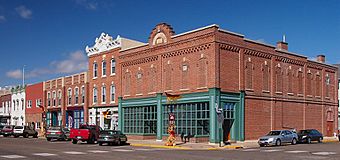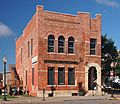Wabasha Commercial Historic District facts for kids
Quick facts for kids |
|
|
Wabasha Commercial Historic District
|
|

Part of the Wabasha Commercial Historic District at the corner of Main Street and Allegheny Avenue
|
|
| Location | Roughly along Main Street between Bridge and Bailey Avenues, Wabasha, Minnesota |
|---|---|
| Area | 10 acres (4.0 ha) |
| Built | 1856–1928 |
| Architect | Multiple |
| Architectural style | Italianate |
| NRHP reference No. | 82003063 |
| Designated HD | April 15, 1982 |
The Wabasha Commercial Historic District is a special area in Wabasha, Minnesota, United States. It protects the historic downtown part of the city. This district includes 52 important buildings that were built between 1856 and 1928.
It was added to the National Register of Historic Places in 1982. This means it is recognized as an important place for its history of business and trade. The district was chosen because its buildings have a similar look and have been used for businesses for a very long time, since the mid-1800s.
Contents
What is the Wabasha Commercial Historic District?
The Wabasha Commercial Historic District is located on a flat area of land next to the Mississippi River. This area was formed by the river over many years. The district covers about 10 acres (4 hectares).
It stretches for three and a half blocks along Wabasha's Main Street. It also extends about one block on each side of Main Street. There is a small part that goes southwest along Pembroke Avenue.
Buildings in the District
When the district was first recognized in 1982, it had 59 buildings. Most of these buildings, about 44 of them, were built in the second half of the 1800s. The district mainly has buildings used for businesses. However, the western end of the district also includes a few houses.
Building Styles and Features
The business buildings in the district mostly look alike. Nearly all of them are two stories tall. They have brick walls or brick fronts. Their design is a business version of Italianate architecture. This style was popular in the mid-1800s.
The decorations on these buildings are simple. They often have brick cornices, which are decorative ledges at the top of the walls. They also have stone window sills and keystones. Keystones are wedge-shaped stones at the top of an arch or window. The windows themselves come in a few different styles.
One building in the district, the Hurd House–Anderson Hotel, was already listed on the National Register in 1978. Eight buildings in the district were not considered "contributing properties." This means they were built or changed too much outside the main time period or style of the district.
Images for kids







